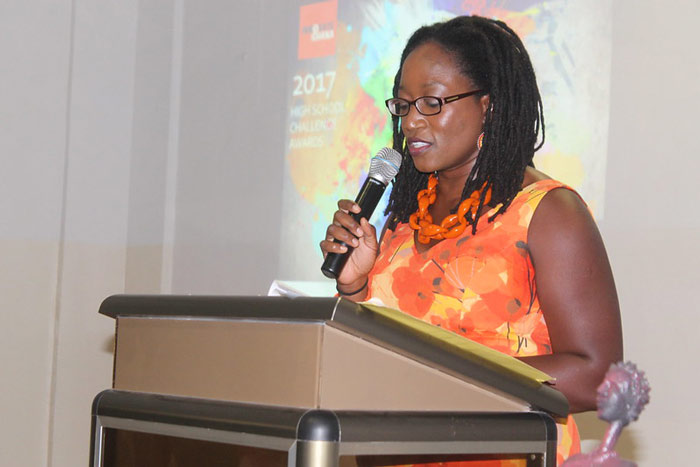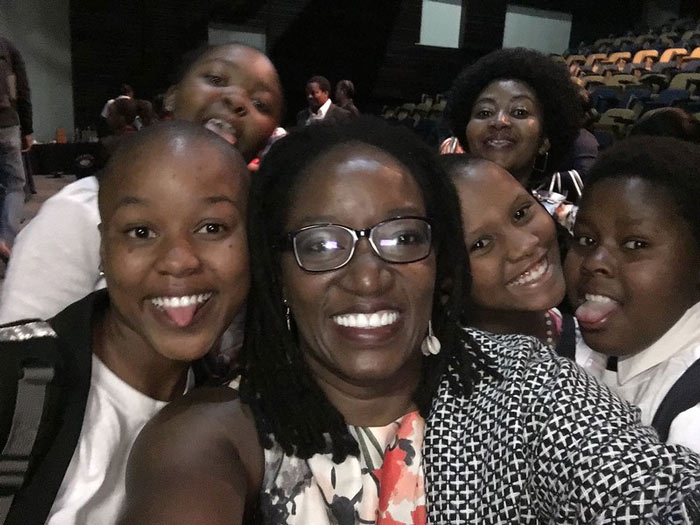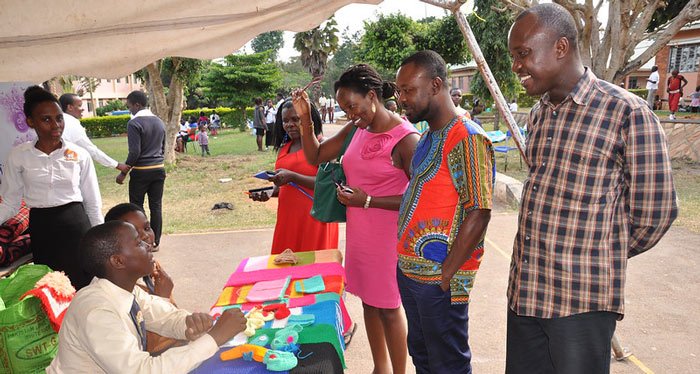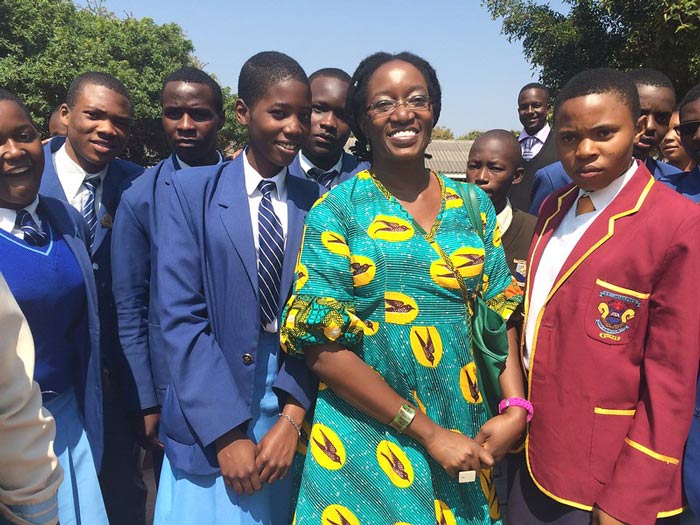
The future of the world rests in the hands of young people. In order to shape that future and create a better, more functional and productive tomorrow, many will agree that the work starts today.
Across the world, many of our leaders have stepped up and dedicated their work lives to molding, equipping and preparing tomorrow’s leaders. Elizabeth Elango Bintliff is one of them. She is a development professional with over 20 years of experience working in developing countries and emerging economies. Ms. Bintliff holds a Bachelor’s Degree in International Affairs from Kennesaw State University in Georgia, and a Masters in African Studies from Yale University. She was a Fulbright Scholar in Zanzibar and started her career at the Carter Presidential Center in Atlanta, GA.
Having worked notably for Heifer International and now JA Africa (including others), Elizabeth Elango Bintliff has earned numerous awards and recognition for her impactful contributions to humanity, including being named one of the 100 Most Influential African Women in 2018.
As you are about to discover in my interview with her, what is also unquestionably most impressive about the forty-something-year old from Cameroon, is her dedication, passion and drive for the work she and her team are doing to empower Africa’s youth at the ground level. Meet Elizabeth Elango Bintliff…
Who is Elizabeth Elango Bintliff in your own words?
Elizabeth Elango Bintliff: Personally, I identify as an African woman, a mother, a professional, a friend, a change-maker and a lifter of people. Those are the things that are core to my identity, I have an outgoing personality; I genuinely enjoy other people and being a part of their journey.
Professionally, I am currently the CEO of Junior Achievement Africa, a role I took on four and a half years ago, having left my last job and living for 25 years in the United States to move back to Africa.
Speaking a little more historically, I was born and raised in Cameroon and lived there through high school and in 1993, I moved to the US to do my university education.
At the time, my father was a History professor at Kennesaw State University in Atlanta so I did my undergraduate studies in International Relations there. I studied International Relations because I had this fascination for the world and searching for the world beyond Cameroon. At the time I hadn’t traveled anywhere else so I was really curious. Having grown up with a father who was a historian influenced my outlook. I think my curiosity was something that came out of my conversations with my father.
After University, I did my Masters at Yale University. While there, I had to, as part of my coursework, learn an African language, none of which I spoke at the time besides my mother’s native language which I speak a little of. My options were Swahili and Twi, which is the main language in Ghana. I chose Swahili at the time because I told myself I was more likely to live in Kenya than in Ghana. Interestingly, today I work in Ghana, a good lesson to show that life doesn’t always tell you what lies ahead.
After my studies, I moved to Arkansas for work and ended up living and working there for 15 years. During the course of that career, I traveled extensively in Africa and have been able to visit more than half of the countries on the continent; which has really taught me a lot about the Continent, the things that bind us, the ways that we’re similar and the ways that we are dissimilar.
Please tell us about Junior Achievement (JA) Africa and the work you do with the Organization.
Elizabeth Elango Bintliff: Junior Achievement is a 100-old global organization that started in the United States. Our mission is to empower young people to be prepared for life as professional adults. JA has been working in Africa for over 40 years. We work to bridge the gap that exists between what they’re learning in school and what they need to be successful at the workplace. This gap is wide because unfortunately, our education systems have largely not adapted to the changing work environment. The way we teach young people has mostly remained unchanged for decades. JA’s work focuses on making education more work relevant and we do this by focusing on entrepreneurship education, financial literacy, and workforce readiness.
The reasons for our focus on these three areas are because we’re not creating many jobs as we’re graduating young people out of school. Across sub-Saharan Africa, 3 million jobs are created every year whilst about 11 million graduates enter the workforce every year. So young people are going into the workforce not finding opportunities. On average it takes about six years for graduates to find their first job. Many of these young people become entrepreneurs to earn a livelihood; yet we don’t typically teach them entrepreneurship while in school. JA Africa gives them exposure to entrepreneurship so that if they have to start a business, they can have a basic understanding of running a business.
Financial literacy is essential for business and personal success so we teach young people to understand basic concepts like earning, saving as well as more sophisticated concepts such as insurance, taxation, investment, fraud debt management among others.
Finally, we do workforce readiness training because for the jobs that are being created on the continent, employers are reporting that they can’t find talents to fill those jobs. We are experiencing the strange phenomenon where young people are risking their lives to leave the continent in search of opportunities elsewhere and yet the opportunities that are on the continent are being filled by people coming in from outside. So there is really a skills mismatch that needs to be addressed. We currently work in 15 African countries.
What would you say are some of the Organization’s greatest accomplishments in the past couple of years and why?
Elizabeth Elango Bintliff: In the past couple of years, we’ve been able to accomplish quite a number of things. Growth in our reach is one; we reach 250,000 a year and that represents significant growth; but it still pales in terms of the need and so our aspiration is to grow by the millions. In order to do that, we believe that we need to explore the digital space as a tool or pathway to reach more young people. We started testing this theory around reach about three years ago when we asked ourselves ”Where do young people reside and how can we reach them quickly?” We found out that social media was one, so we started using that as a tool to pass along learning, job, scholarship and fellowship opportunities. With over one million followers now, that has been a success for us.
We are steadily building a movement of stakeholders around youth empowerment. We have a strong Board of professionals from all over the world who support and guide our work. We’ve been able to obtain the support of government at high levels in most of the countries where we work. We’ve demonstrated and documented our impact through a recent independently-conducted evaluation.
Donors recognized this impact and show their support by funding the work. We are proud of these. There’s a lot of effort, opportunities, and interest in the space but we have been able to build that interest and made different stakeholders care in a different way. For me, change-agency is really about individuals, people coming together around an idea so a lot of our efforts to communicate why youth empowerment is important has really been about making the average person around the world care. When we look at the future of work, Africa is going to have the largest workforce in the world in less than 20 years. How business and economies function in the future will depend in part on how well we prepare young people today. That’s really what our focus is and where our great successes have come from.
As a leader, what are some challenges you have faced and how did you overcome them?
Elizabeth Elango Bintliff: One challenge I face over and over as leader is that people tend to underestimate themselves and their abilities. So as leader, my job has is to help the teams and the individuals within the team understand that they are capable of doing more than they think they can or have in the past, which I believe is a lifelong journey. Teaching people to believe in themselves and their abilities, also teaching people how to function beyond the confines of a role that either society, a job description or whatever thing that has been imposed upon them is one of the great challenges of leadership.
The second challenge comes with managing how I estimate my own self and sometimes other people’s underestimation of my capabilities. Waking up daily believing that you’re capable of doing more than you did the day before, that ideas have value if you can bring them to fruition takes a lot of personal effort and deep digging. Everyone looks up to the leader in the organization and so as a leader, I have a responsibility to my people to invest in my own personal growth.
These challenges are in themselves the reason why I took on this job. It is my way of helping young people see some of these things. I want young people to understand these challenges earlier in their lives so that they will be better placed to succeed later in life.
As you mentioned earlier, JA Africa carries out programs in some 15 countries in sub-Saharan Africa. What are some commonalities you have noticed in the people of these countries?
Elizabeth Elango Bintliff: There is truly so much that binds us as Africans. For someone who was a student of Africa history, I am endlessly fascinated when I get off the plane for the first time in a new country. I like that odd feeling of being in a strange place that is mixed with a haunting familiarity that makes me feel so much at home because it still feels and sounds like the last place I was on the other side of the continent. One of the things that fascinates me is seeing how the Bantu migrations influence the composition of Africa today. I think every African should read about that.
Besides the historical and cultural similarities across the Continent, the things that I find specific to my work is that young people everywhere in Africa are eager for opportunities. They are eager to make their mark in the world and become agents of change. The world is often, very dismissive of Africa’s potential. There is this notion that kids in Africa are lazy. It is false. They are no less intelligent, driven, curious or capable that kids elsewhere in the world. Even in Africa, generationally, there’s been a mismatch of what we expect of ourselves and what we are capable of. One of the things that I am most excited about this young generation is that they’re rejecting the long-held and old notions of which previous generations have defined Africa. I see it everywhere across Africa and that makes me excited. One game-changer for these young people is Social Media and how much it exposed young people, at an early age, to the world which has made them think differently about themselves, their aspirations and potential to imagine and create in business, art, etc. These are some things that I find most similar to Africa and its youth.
How did growing up in Cameroon prepare you for the work you do today?
Elizabeth Elango Bintliff: My childhood is fundamental to who I am. Much of my sense of identity is rooted in Cameroon. It is one of the reasons why I’ve never changed my citizenship, even when I had the opportunity and the motive. I think it would confuse me to the core.
My Cameroonian childhood was pretty amazing. I remember it fondly. I remember growing up there. My academic experiences started there. Growing up as a daughter of a historian and of a working mother deeply influenced my connection to Africa, my career path and my work ethic. My mother, who was an executive her whole career, also defined what I knew was possible for a woman. I recently interviewed her regarding her career and she told me about how, since she graduated with her master’s degree in the US in the 60s, she has never interviewed for a job; rather she has always been approached with job offers. I thought this was just fascinating; the idea that people valued her skills so highly that she never had to market them. She never created a CV or a resume in her life! I inherited from my Mom the fearlessness and joy with which she approached her work. I inherited from my Dad my love for the word in general and Africa – Cameroon in particular. Those two things defined my own career path and Cameroon is the beautiful backdrop from which my journey towards self-actualization began.
On a lighter note, what are some of your other passions (outside of work)?
Elizabeth Elango Bintliff: I am passionate about all things African: travel, people, history, language, architecture, culture, food, you name it. I enjoy a good Senegalese Thieboudienne as much as I love a Tanzanian Kuku Makange. I’m happy walking around the Larabanga Mosque in Northern Ghana or the Palace of the Buganda people in Uganda.
I’m especially passionate about African art. I am a huge collector of contemporary paintings, mostly portraiture of African women. I own pieces from all over the continent and I hope to show my collection someday. Even I have never seen my entire collection on a wall because I have more pieces than I have wall space. One of my dreams is to unroll my paintings and show them to the world someday and showcase the brilliance of African contemporary artists.
My most important passion are my children. I have two girls and I consider being their mother the most important role in my life. Raising girls who are part African in the world today is something that I approach consciously, making sure they grow to appreciate their culture, realize and own their power, their voices, their roles and place in the world and ensuring their childhood is joy-filled is a job I take very seriously.
I have a good, blessed life and I’m fortunate to also have good friends and a loving family. When I’m not at work, that’s where I put my energies into. That and an unhealthy sprinkling of reality TV, which I find so entertaining. I love to read. I travel as often as I can for non-business trips, usually within Africa.
—in closing?
Elizabeth Elango Bintliff: In looking at the future of Africa, I believe it is an exciting time to be a young African today because the opportunities are endless. If we can orient our young people properly to identify and tap into those opportunities, what the continent will look like 20, 30 years from today would defy expectations and will alter the reputational challenges that have held Africa back for so many generations in the past, and that’s why I do the work I do, as proof of my belief in our young people to do just that.



Website: ja-africa.org
Lema is on Twitter: @LemaAbeng. Website: www.lemaabeng.com
